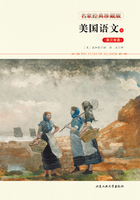
第30章 Character of Napoleon Bonaparte 拿破仑·波拿巴的性格
Charles Phillips, 1787-1859, an eminent barrister and orator, was born in Sligo, Ireland, and died in London. He gained much of his reputation as an advocate in criminal cases. In his youth he published some verses; later in life he became the author of several works, chiefly of biography.
He is fallen! We may now pause before that splendid prodigy, which towered among us like some ancient ruin, whose power terrified the glance its magnificence attracted. Grand, gloomy, and peculiar, he sat upon the throne a sceptered hermit, wrapt in the solitude of his own originality. A mind, bold, independent, and decisive; a will, despotic in its dictates;an energy that distanced expedition; and a conscience, pliable to every touch of interest, marked the outlines of this extraordinary character—the most extraordinary, perhaps, that in the annals of this world ever rose, or reigned, or fell.
Flung into life in the midst of a revolution that quickened every energy of a people who acknowledged no superior, he commenced his course, a stranger by birth, and a scholar by charity. With no friend but his sword, and no fortune but his talents, he rushed into the lists where rank, and wealth, and genius had arrayed themselves, and competition fled from him, as from the glance of destiny.
He knew no motive but interest; acknowledged no criterion but success; he worshiped no God but ambition; and, with an eastern devotion, he knelt at the shrine of his idolatry. Subsidiary to this, there was no creed that he did not profess, there was no opinion that he did not promulgate: in the hope of a dynasty, he upheld the crescent; for the sake of a divorce, he bowed before the cross; the orphan of St. Louis, he became the adopted child of the Republic; and, with a parricidal ingratitude, on the ruins both of the throne and the tribune, he reared the throne of his despotism. A professed Catholic, he imprisoned the Pope; a pretended patriot, he impoverished the country; and in the name of Brutus, he grasped without remorse, and wore without shame, the diadem of the Caesars.
The whole continent trembled at beholding the audacity of his designs, and the miracle of their execution. Skepticism bowed to the prodigies of his performance; romance assumed the air of history; nor was there aught too incredible for belief, or too fanciful for expectation, when the world saw a subaltern of Corsica waving his imperial flag over her most ancient capitals. All the visions of antiquity became commonplace in his contemplation: kings were his people; nations were his outposts; and he disposed of courts, and crowns, and camps, and churches, and cabinets, as if they were the titular dignitaries of the chessboard!
Amid all these changes, he stood immutable as adamant. It mattered little whether in the field, or in the drawing-room; with the mob, or the levee; wearing the Jacobin bonnet, or the iron crown; banishing a Braganza, or espousing a Hapsburg; dictating peace on a raft to the Czar of Russia, or contemplating defeat at the gallows of Leipsic he was still the same military despot.
In this wonderful combination, his affectations of literature must not be omitted. The jailer of the press, he affected the patronage of letters; the proscriber of books, he encouraged philosophy; the persecutor of authors, and the murderer of printers, he yet pretended to the protection of learning; the assassin of Palm, the silencer of De Stael, and the denouncer of Kotzebue, he was the friend of David, the benefactor of De Lille, and sent his academic prize to the philosopher of England.
Such a medley of contradictions, and, at the same time, such an individual consistency, were never united in the same character. A royalist, a republican, and an emperor; a Mohammedan, a Catholic, and a patron of the synagogue; a subaltern and a sovereign; a traitor and a tyrant; a Christian and an infidel; he was, through all his vicissitudes, the same stern, impatient, inflexible original; the same mysterious, incomprehensible self; the man without a model, and without a shadow.
☆ ☆ ☆ ☆ ☆ ☆ ☆ ☆ ☆ ☆ ☆ ☆ ☆ ☆ ☆ ☆ ☆ ☆ ☆ ☆ ☆ ☆ ☆ ☆ ☆
查尔斯·菲利普(1787 ~1859年),知名律师兼演说家,生于爱尔兰的斯莱戈,在伦敦病逝。他因为在一次刑事案件中担任辩护律师而一举成名。他年轻的时候发表过几篇诗歌,后来出版过一些作品,主要是传记。
他倒下了!现在,我们在天才的面前停下脚步,他高耸地伫立在我们中间,看起来就像是古代的遗迹,他的力量震慑了大家的目光。伟大、忧郁且独特,他头戴王室冠冕,坐在王座上,周围遍布着他不同寻常的孤寂。他的思想大胆而独特,他的意志体现出独裁者的专横,拥有能够长途跋涉的充沛精力,良心容易受到每一种切身利益的影响。所有这些,构成了这一奇特的性格特征,或许其最与众不同的就是体现在这个世界交替崛起、辉煌和衰落的编年史中。
投入一场大革命之中,这场大革命很快把那些认为没有优越感的人号召起来。他开始了他的人生旅程,一个天生的陌生人,一个充满善意的学者。他没有朋友,只有一把剑;他没有财富,却有着出众的才华;他匆忙挤进用社会等级、财富和天分对人进行排位的名册之中,但是他逃离了竞争,远离了命运的垂青。
他的眼里只有利益,没有动机;他只求成功,而不要求任何标准;他崇拜的不是上帝,而是野心。凭着一种东方的虔诚,他跪拜在偶像的神龛面前。不过,他不会公开宣称他的信仰,也不会公开发表他的意见。为了实现建立王朝的愿望,他支持奥斯曼帝国;为了离婚,他在十字架前低下头颅;他是圣路易斯的孤儿,后来成为共和国的养子;在王位和讲台的废墟之上,他凭借杀死长者的忘恩负义,建立起专制统治的宝座。作为一个宣誓信教的天主教徒,他公开囚禁了教皇;作为一个假惺惺的爱国主义者,他让国家深陷贫困之中;他以布鲁图的名义暗杀恺撒,毫不忏悔地夺取皇帝的权位,宣誓时却毫无愧疚。
整个欧洲大陆都在颤抖地注视着他计划的可耻与处决属下的不可思议。怀疑他的人无不折服于他的表演才能。传奇色彩被披上了历史的大衣。当这个世界见证了一个科西嘉中尉对着他古老帝国的首都挥舞着国旗的时候,就信仰而言,任何事都难以让人相信;就期待而言,再多的想象也是徒劳。任何对过去的幻象,在他的思绪中变成了最习以为常的事情:国王是他的臣民,国家是他的前哨所,他随意摆布法律、王权、军营、教堂和内阁,好像它们都只是任其摆布的棋子!
然而,在这些巨变中,他顽强而坚定不移地屹立着。下面所有一切都无法打倒他:无论是在外面写生,还是在画室作画;无论是那些暴民,还是早朝时准备觐见他的人;无论是头戴雅各宾软帽的人,还是戴着王冠的人;无论是驱逐了布拉甘萨家族,又支持哈布斯堡王朝。在前去迎接俄国沙皇的竹筏上宣誓要和平,脑子里却在思索着打破套在他同样采取军事专制的莱比锡头上的绞刑架。
要想深入了解这个奇妙的性格综合体,自然不能忽略他对文学的热爱:作为新闻出版业的狱卒,他假装热情地鼓励文学创作;作为排斥书籍的人,他却大肆鼓励哲学;作为迫害作家和出版商的凶手,他却摆出一副保护知识的姿态;作为谋杀帕尔姆的凶手、抹杀德·斯塔尔的人和斥责科茨布的人,他却成了大卫的朋友、德·里尔的赞助者,将他的学术奖颁发给了英国的哲学家。
像这样一个矛盾冲突的混合体,同时又保持一贯个性的人,绝对不会将两种性格融为一体。一位保皇主义者、一位共和主义者,还是一位皇帝;一位伊斯兰教徒、一位天主教徒,同时还是犹太教会的赞助者;一位中尉,又是一位君主;一个叛国贼,又是一位暴君;一位基督徒,又是一位异教徒。通过他的兴衰成败来看,他原本是个严厉、焦虑而坚定不移的人;一个充满神秘且不被人理解的人;一个无法效仿的人;一个没有影子的人。